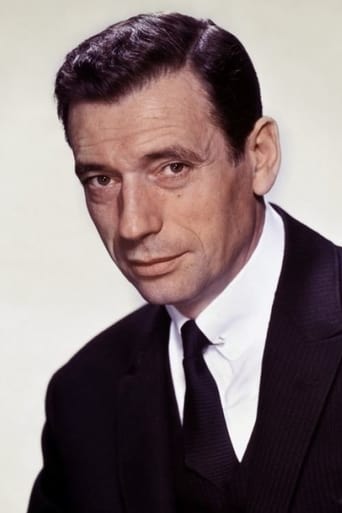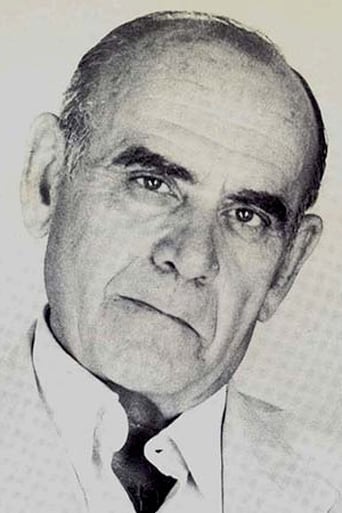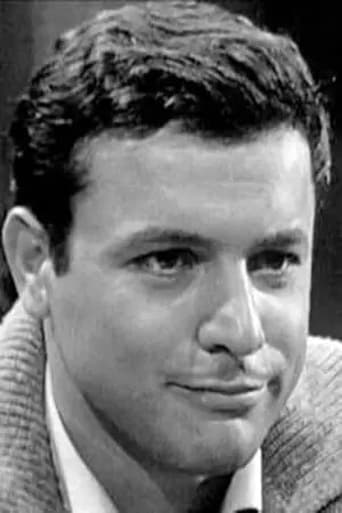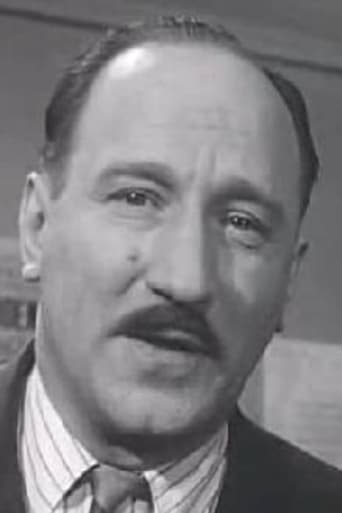michaelgfalk
This film's an experiment, and I think it's fair to say that it doesn't quite pull it off. But I nonetheless found it quite an engaging film.The plot is threadbare. An American journalist and her French husband are accidentally embroiled in an occupation at a factory. The different characters put their points of view about the occupation, and as the film goes on, the perspective widens, until it really isn't about the factory anymore, but about the state of France.There are some striking scenes here, all of them pictorial rather than dramatic. Many of the characters speak to camera in one-sided dialogues (rather than monologues— the distinction is obvious when you watch). There are a few of Godard's trademark long panning shots. Fragments of vision recur or are recast. The effect of this style is to externalise all the characters. None is a mind or a soul. They are rather expressions of a certain point of view, or noises in the cacophony of society and history.One of the film's more successful elements is its frame-narrative. Two voices discuss how the film ought to be put together, what it ought to achieve, and play around with the characters' fates. The frequent references to Brecht in the body of the film meld nicely with the frame, and make it clear that Godard is going for an "Entfremdungseffekt"—this is not a film to be immersed in, but one that is supposed to provoke reflection.And that it most certainly does. I felt downright uncomfortable at times, as the film ruthlessly sent up the supposed insight of intellectuals, and the supposed historical effectiveness of political parties. But the film also had a light touch, and its gloriously silly penultimate scene left me laughing at my political certainties, rather than empty and sad.It doesn't quite cohere, but I'm very glad I saw it. 7/10
s-wesner1
Tout Va Bien: A Movie Review Well, this divisive film certainly has polarized both those for and against consumerism at its finest: capitalism. One understands through the film that there are a lot of disgruntled people out there in "la Belle France" who basically strive hard to change things, from time to time, when times get rough, or things get intolerable in the political scheme of things. We see from the film, certain things that really catch our visual gaze: the eerie supermarket scene, where shoppers are basically targeted for their purchasing large quantities of goods big enough to feed an entire Catholic household by angry "anti-consumerist" revolutionaries who basically seem out of love with the French version of the supermarket, l'hyper-marché. We see that, not only in this scene but in others, there are many disgruntled workers/student activists, who want desperately to weed out the continuing problems in their society that won't seem to go away, no matter what they do. There are, next, the problems faced by the meat-packing workers who work in the meat-packing plant, who are faced with the problems wrought by working at a meat- packing plant, namely, cancer. Though these workers have a boss who is apparently jolly, cheery, and indeed, corpulent, they have nothing to live for as they are all dissatisfied with their jobs and indeed have to sing songs of protest directly in "leur patron's" face in order to get the message across to him that they "ain't gonna take it anymore." In fact, this movie reminds me so much of "Potiche" in its almost comedic look at French workers striking, so unique and unusual, and even creative in their tactics, are they. In Potiche, a movie which I am probably not even supposed to be reviewing on here, we find that a suburban housewife is tired of her banal existence as a housewife and wants instead to be mayor of her small town (her alternative existence is not very good; all she gets in that life is being chased around by squirrels on her daily jogs, washing dishes and cooking in her apron, and getting cheated on by her cigar- smoking husband). So, we find that, Catherine Deneuve, who plays this feisty house-wife- no-more character, becomes the lead striker in that she address the strikers' concerns whole-heartedly, being the former wife of the deceased husband and woman-chaser, and, like a true fiery politician, changes the way things were previously run at their car-producing- factory (or, something like that). So, while some may immediately label Godard as a boring film-producer who only produces film for his own money-making benefit (and, after all, we all have to earn our bread somehow, don't we?), there are those of us out there who have to acknowledge that the man is a prolific film- producer, and we can't just be jealous if there is nothing we can do about it. In addition, there are scenes in Tout Va bien which makes us question whether really, "Tout Va bien" or, "Tout ne va pas bien, du tout." There are scenes of utter chaos, to be sure, in the supermarket scene, which leads the average viewer to believe in miracles; the shoppers eventually catch on that there is enough chaos in the air that they will not be penalized if they take a little extra of the food and other supplies that the grocery store has to offer. The film-makers who are documenting the strike in this way truly believe that they need to change the mechanical way in which the butchers, or, before that, the factory- worker-butchers, are forced to behave; like robots. But, as we human beings are not robots, we must not be forced to act in this way for too long, or else, we will explode. The building in which many of these workers work, singing rather merry protest songs, cheerfully, along the lines of, "let's behead le patron" and things like that to scare him, aren't pacified by his apparent placidness and seemingly sociable manner and willingness to become one with his inferiors, at least for five minutes. We find that, indeed, the workers hate him, anyway, and will line up outside his door for days, weeks, months, if they have to. One unforgettable moment, anyway, is when the boss actually loses, it, technically, and throws a brick to pee out the window; the chants are surprisingly melodious, in fact, and they verge on rounds, which is quite incredible to me that strikers' songs, supposedly created on the spur of the moment, spun out of workers' minds, can be quite so creative. So, this movie, which starts out patriotic enough, advertising "la France" with the red, white and blue of its flag (it puts its letters in this colorful design), spans the years from 1968, when there were great student protests and somewhat violent riots against the police, to 1972, when the fictional, but largely truth-based strikes take place. The director is very revealing in the ways in which he shoots his scenes, he lays everything bare: his voice supposedly is heard calling the shots, literally, like, "Tout Va Bien, part two, cut," or "Tout Va Bien, scene three, take 5, cut," etcetera, etcetera, until the film really begins. Jane Fonda, and Yves Montand, and Victor Capprioli, also star, so no wonder that this was a popular film, at least during its time. Indeed, this is quite a film, a lot of work went into it.
Emil Bakkum
In our modern society revolutions have become rare. And the times that followed may 1968 were indeed a revolution, albeit in Europe a relatively soft one. In the years 1968-1975 I passed the adolescence, and consequently the era has left a lasting impression on me. Much later I realized that the turmoil of the New Left had already started in the preceding decade, notably in the USA. First there was the civil rights movement, against the segregation. And then there was the resistance against the horrific and pointless Vietnamese war. It launched a counter culture, of hippies and flower power, and new methods of social interaction. The Asean and African nationalist movements enjoyed their newly gained freedom, and in Latin America the dictatorships tumbled. In retrospect many of the new ideas may not have been viable, and often even decadent. But still, for me it is impossible to give an objective judgment of the film Tout va bien. This is especially so, since at the time I have missed the film and therefore the belated acquaintance was making up arrears. To me the film is inspiring, because it uses a truly alternative technique in the narrative. And because it is a reflection on the contemporary thoughts and developments. The technique uses mainly monologues, in which the main characters explain their feelings and thoughts just as if they are interviewed. It starts as a "Lui et elle" film. The French film producer Jacques (Yves Montand) and the American radio reporter Susan (Jane Fonda) have an affair. It is 1972, and they ponder over the events in their careers, notably after may 1968. Jacques makes advertisement clips, but feels unhappy about it. He accompanies Susan to an interview with the manager of the Salumi meat factory. However, just before they enter the building a wild strike is initiated, the offices are occupied by the blue collar workers, and the manager is taken hostage (for some reason, even in our days this can still go unpunished in France). The official of the communist union CGT is furious, and complains about the inadequacy of their actions. The manager uses abusive language, but is also phlegmatic, and defends the conservative entrepreneurial views. We also hear the opinions and feelings of some of the workers. Jacques and Susan are locked up together with the manager, for more than a day. Subsequently we witness several student uproars and riots, which are dispersed by the police. A real story line is absent, and therefore the film can simply end just like he began. In conclusion, the film is a surprising experience. I guess the best way of digesting it would be to analyze all those the monologues, and empathize with them. And I guess that the CGT official is right. Other illustrious films about those days are "Strawberry statement", "Fritz the Cat" (animation) and possibly the most outstanding of all: "Hair". If you like social films, you may find my other reviews interesting.
frankgaipa
For a film by Godard to be as devoid of beauty, in either sound or image, as is Tout va bien, is extremely rare. The Dziga Verov Group video stuff, if I'm grabbing the right memories, back at the time at the PFA had extraordinary moments. I've always considered him a director who, along with, in particular, Rohmer, knows how to shoot women. Fonda projects a searching integrity, yet sounds arch and looks mawkish, somehow unworthy of Montand. Montand for the most part acts his lines, while she "reads" or, worse, declaims hers. Did she think the politics of the film prohibited a natural tone? Did one or the other of the directors prohibit one? Would anyone today have rendered the film's workers so strident, so atonal, though clearly the directors did it on purpose and with a purposeThose are just gut reactions, my spoiled-by-the-present knee-jerk attempt to glean cinema from a work with aims that may supersede. I thought I'd seen all the Godard that's been available here, and know I saw Godard here in the Bay Area in person, then Godard with Gorin at least twice, and Gorin alone once or twice more. Why then hadn't I seen this? Or how did I manage to forget it?Images likely to stay with me: The check-signings of the opening credits (which made me fantasize some blockbuster director beginning a film the same way); the boss frantic to find a toilet (Has anyone not dreamed this nightmare at least once?); the unending roar of cash registers in the super supermarket at the end. The last sent me on an odd fantasy -- customers reversing the tide, bringing unnecessary possessions into a super supermarket, filling the shelves, then the aisles, and all the airspace until the place is so full it explodes.Though not quite the same thing, but see the not too long ago South Park episode aimed at megastores.






